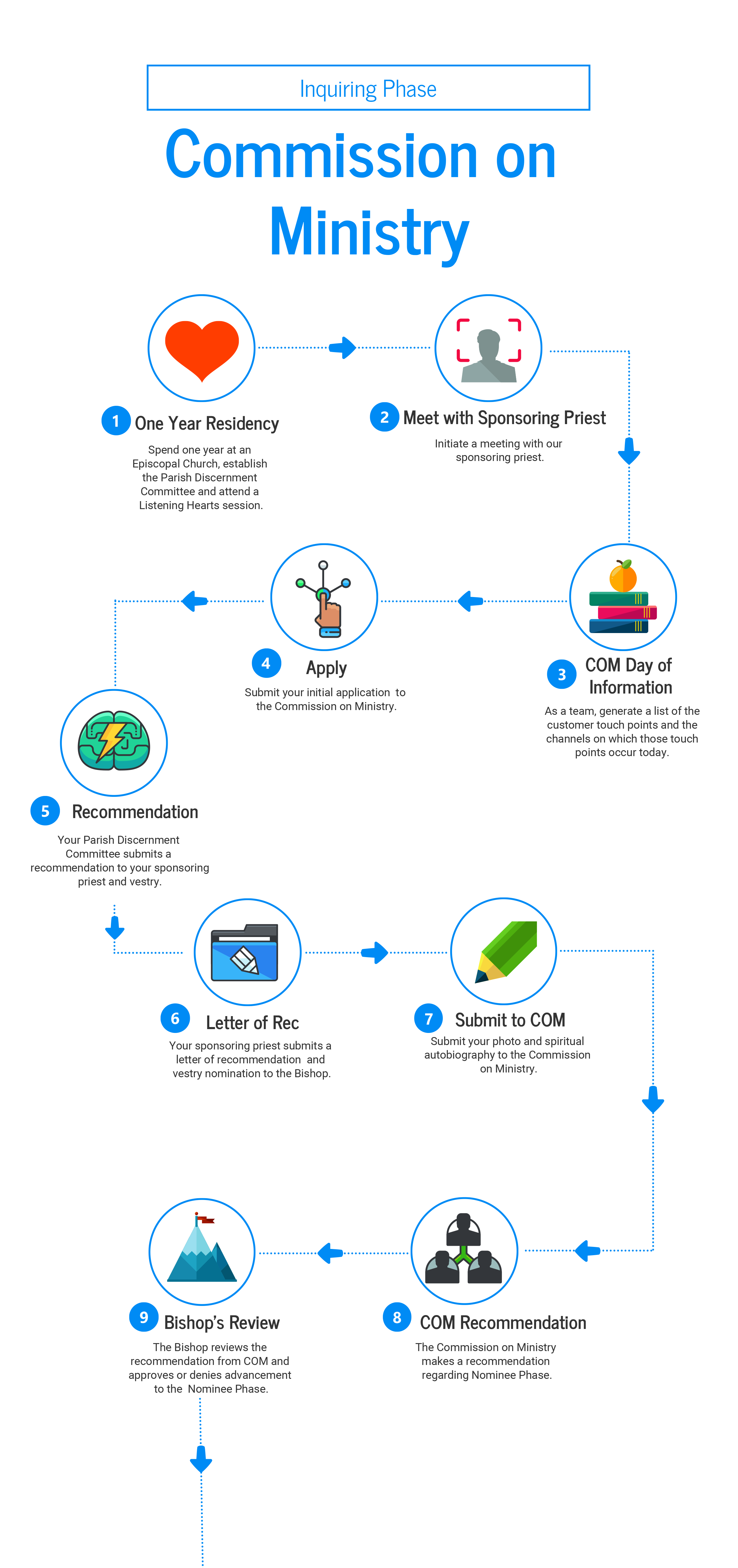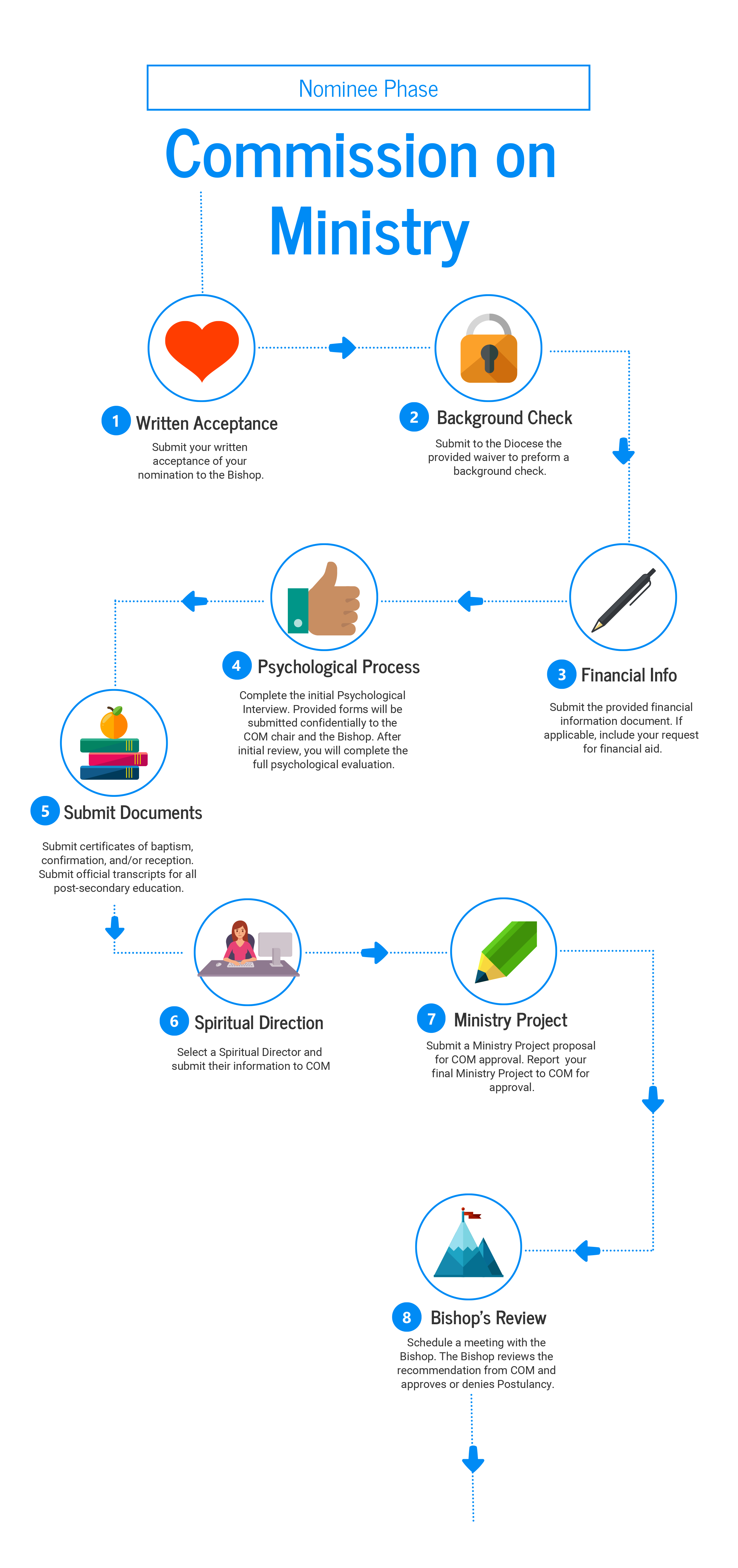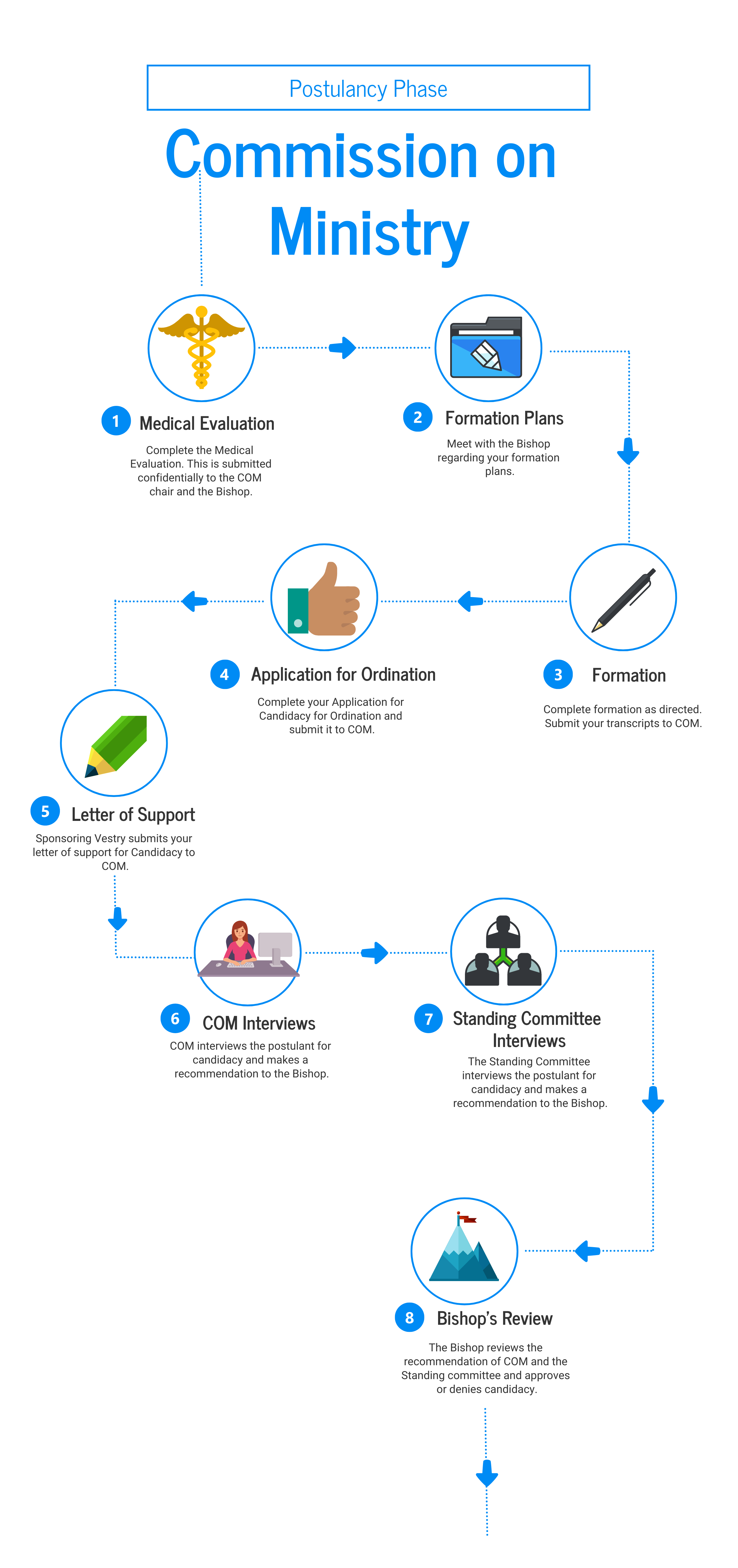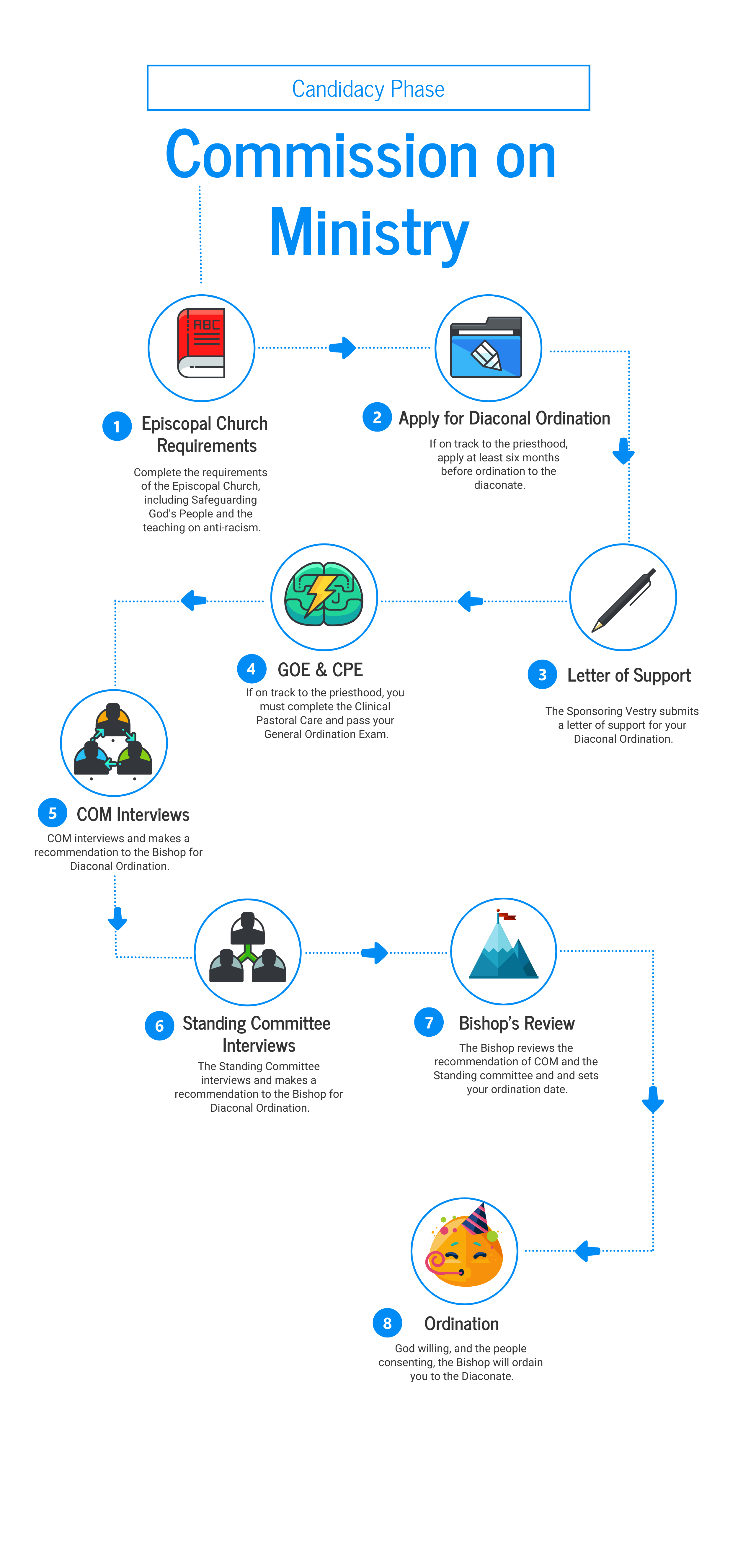A New Process for Discernment
Recently, the Episcopal Diocese of San Diego and the Commission on Ministry (COM) have revamped the discernment process for anyone inquiring about ordination as a call in their lives.
What is discernment, and why do we have a formal process?
Discernment is prayerful and intentional listening someone does to better understand what God might be calling them to do. It can lead to someone becoming a teacher, a healthcare worker, or in the case of ordained ministry, a deacon or priest. Because of how important sacramental leadership is in our context, we require those who may be called to ordained ministry to discern their call within the context of their church community, leaders at the local and diocesan level, and through formal ministerial education.
Ultimately, we must test, not just trust, that God is calling someone into this aspect of the church’s life. Formal discernment is about making sure someone is called, adequately trained, and spiritually, emotionally, and mentally capable of leading and providing for those in their care. There is joy in discernment, and there are also appropriate challenges that hone the skills one needs to excel in these specific roles.
Dawn Stary, candidate for ordination, said, “My journey of discernment was filled with grace and love. At times, it felt vulnerable and intimidating to reveal my hopes and dreams to several different groups. However, every person who interviewed me along the way was kind and compassionate. Each person took my call seriously and each person held my story prayerfully and thoughtfully. Room was made for the Holy Spirit to move and I’m grateful for that and all the support I encountered.”
Brian Petersen, ordained a priest as of June 18th, 2022, said, “As I look back on my discernment process over the last few years, I can see clearly how much of a time of growth it was for me, both in my relationship with Christ and in my knowledge of myself. I am so thankful for the many opportunities I had to share and reflect on my story, and to see how the various twists and turns of my life have shaped me into the person that God is calling into ministry. Though it was challenging and trying at times, I always felt that I was held and supported by a strong network of people in my home parish and throughout the diocese, and most of all by the abiding presence of Jesus in every step of the journey. It was a Spirit-led and Spirit-filled process throughout, and I feel well equipped and prepared for the next steps in this adventure of serving God’s people.”
Heather Lawrence, current candidate for ordination, said, “From the very first email I sent, vocational discernment in the Episcopal Diocese of San Diego has been supportive and affirming of the call I have sensed in my life since my teenage years in a church pew and youth worship band. Through my discernment journey, this diocese has embodied the element of church that drew me to our denomination, to begin with–the entire process is deeply rooted in community. I appreciate so much how flexible and prayerful the individuals involved along my path here have been through every step–Listening Hearts discerners, my parish discernment committee, the COM, and Bishop Susan. Each of these relationships has truly folded me into the diocese and made it feel like a solid home to which to return, and a powerful place to dream about the future of the church.”
This process is not easy, but it is important. We ask a lot of our ordained ministers, and thus we need to be certain that they are people of grounded spirituality and theology, who can lead pastorally and prophetically as deacons or priests and not have deleterious tendencies for all of our safety’s sake. COM pays special attention to ensuring that the priests have the skills they need to lead communities with a heart for mission and a mind for strategy as they deal with the people and the finances of a congregation.
God has a big mission for the church, and we need leaders capable of rising to the occasion. This process emphasizes discernment as a community and looks to the preparation and preparedness of those seeking to answer God’s call. All of this is to prepare the inquirer and protect the people of God and hopefully will offer opportunities for growth, affirmation, and appropriate challenges for all involved. As you can tell from the reflections this opened with, it works! To God be the glory!
What is the process, and why did it need changing?
Some of you may already know that COM changed the process substantively in October of 2021. Finally, and thanks primarily to the work of Terry Kelly, Mark Patzman, and especially the Rev. Paul Carmona, COM has updated the handbook to the current process.
Simply put, the previous process didn’t have clear handoffs between individual discernment, community discernment, and diocesan discernment. Now, the process has an easy-to-understand, step-by-step path that provides a constructive exploration of an individual’s spiritual gifts for ordained leadership.
The first stage, known as the “Inquiry Phase,” is about the individual inquirer going to their community to express their potential sense of call, starting with their parochial minister and then involving the wider community through a Parish Discernment Committee (PDC), made up of some congregants and diocesan conveners.
The PDC listens and asks appropriate questions of the inquirer, challenging them to elucidate and articulate what their ministry might look like. The PDC is not to be a cheer squad for an inquirer, as that can lead to poor discernment that does more harm than good. Once the parochial minister, the PDC, and inquirer are ready, the inquirer either attends or watches a recording of the latest COM Day of Information, which is hosted by the COM each fall (usually in October). Once done, the inquirer applies (Form 1) for formal discernment within the diocese, and with the COM recommendation and the Bishop’s approval, the inquirer advances to the Nominee phase (previously known as “Aspirancy”, but changed to better align with wider Episcopal Church canons).
The Nominee phase is characterized by ongoing discernment with greater intentionality and focus. For instance, this is where administrative tasks required by the canons become important. There is a background check, psychological evaluation (shared confidentially with the Bishop and COM chair exclusively), financial information sharing (if one wants financial aid for later formal training, i.e. seminary), and other document submittals that help the person in discernment, their community, and the diocese knows if someone is prepared to engage more deeply. It’s not all purely administrative, as one is required to have a consistent spiritual director for themselves, and the opportunity to engage in a ministry project to showcase some of the necessary skills of ordained life as well as to learn from the experience. The COM then makes a recommendation to the Bishop on whether the nominee should move forward or not, and then the Bishop may invite someone in the formal training phase of the discernment process: Postulancy.
This is where things really pick up steam. The Postulancy phase begins an eighteen-month journey (which can be longer depending on the Bishop’s educational requirements for a postulant), at the conclusion of which the postulant may be ordained. Each postulant will have directions from the Bishop as to what their educational journey may require. Regardless of which order one may be called towards, it is likely that Clinical Pastoral Education (CPE) will be part of formation. CPE is usually in a hospital setting, though not always. Whenever the postulant satisfies all the requirements, and the eighteen-month timeline has expired, the postulant applies as a candidate for ordination. The postulant is then interviewed by the COM and the Standing Committee of the diocese, both of which give a recommendation to the Bishop as to whether the postulant should move forward. The Bishop may then approve or deny a postulant to enter the final phase of formal discernment: candidacy for ordination.
The final stage of formal discernment, Candidacy, is a final evaluation of the readiness of an individual for ordained ministry. The last of canonical requirements are completed, and then the individual is either ordained as a vocational deacon (completed process) or the transitional diaconate. The earliest one may be ordained a priest following their transitional diaconate is six months. After completing the requirements (again, reference the handbook, checklist, or illustrations), the candidate applies for ordination. They are interviewed by the COM and Standing Committee, who offer the Bishop a recommendation. Then, if the Bishop approves, the candidate will be given an ordination date that the wider diocese is invited to as a celebration.
by
Category: #Communications, #Evangelism, #Sundays, #Worship & Formation
Respond to this:
One reply to “A New Process for Discernment”
Recent Stories
My mother was ordained an Episcopal priest on January 15, 1994, at All Saints’ Episcopal Church in Beverly Hills. I was ten years old, and her being ordained wasn’t odd […]
In December 2023, I received a letter from Julia Ayala Harris, President of the House of Deputies, saying, “I have reviewed your application and, after prayerful discernment, invite you to […]
When we love something, we share it with our friends and family; like a new show on Netflix or a great restaurant in the neighborhood, we can’t help but share […]









Thank you so much Fr. Richard and the COM, including Bishop Susan, for this helpful diagrama of the ordination process and your great support, and the words of by the ordinands and candidates; excellent.
Have a great continuation of the week,
Heartly,
Salvador